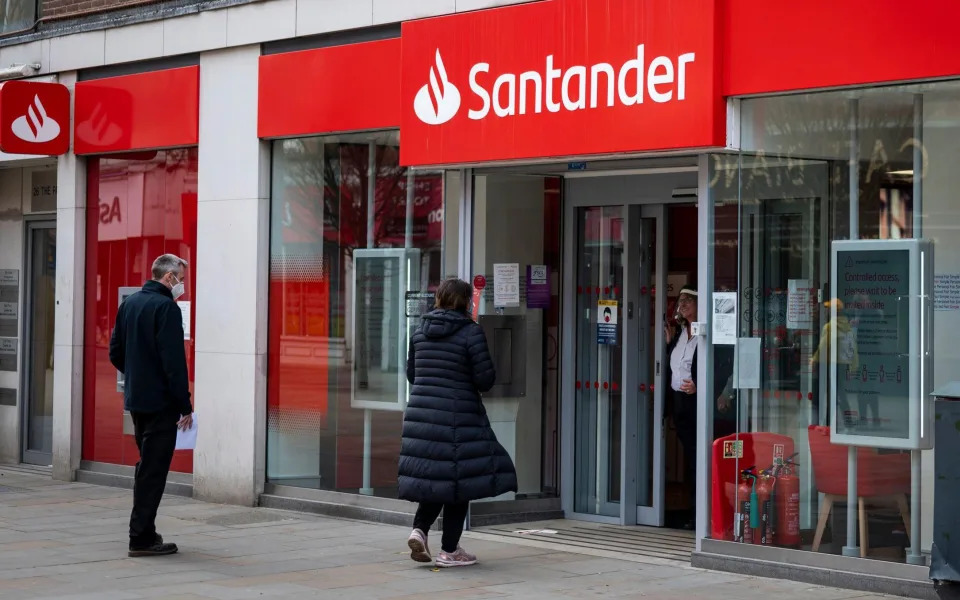https://sg.yahoo.com/style/big-banks-pocket-extra-5-100547104.html
Big banks pocket extra £5.5bn by failing to pass on savings rates
Four of Britain’s biggest banks have pocketed an extra £5.5bn by failing to pass on rising interest rates to savers.
Banks have been quick to pass on successive increases in the Bank Rate – which rose from 0.25pc in January to 4pc in February – to mortgage borrowers but savers still face relatively paltry returns, especially when compared to inflation.
In annual reports released in recent weeks, Barclays, NatWest, Lloyds and Santander reported large increases in their “net interest” income – the difference between why they charge borrowers and pay savers.
Lloyds Banking Group, which includes Lloyds, Halifax and Bank of Scotland, reported an uplift of £2bn last year, with its net interest income rising from £11.2bn to £13.2bn.
Its net interest margin – the difference between what it charges for loans and pays out on deposits – increased from 2.54pc to 2.94pc.
NatWest Group, which runs the NatWest and Royal Bank of Scotland brands, said its net interest income rose from £7.5bn to £9.8bn. Its net interest margin climbed from 2.3pc to 2.85pc.
Likewise, Barclays UK reported income rose from £5.2bn to £5.9bn. The bank’s net interest margin was 2.86pc last year, compared with 2.52pc the year before.
Net interest income at Santander UK rose by £475m, from £3.9bn to £4.4bn.
Danny Kruger, a Conservative MP on the Treasury Select Committee, called on the regulator, the Financial Conduct Authority, to take action on banks’ failure to pass on interest rate rises.
He said: “Something is going wrong when banks are profiting from rising interest rates while savers aren’t seeing the benefits.
“The FCA should investigate the conduct of the banks as a matter of urgency.”
Anna Bowes, of the analyst Savings Champion, said: “The high street banks are notorious for being slow to pass on higher interest rates to savers, which is a disgrace considering they hold the most money in their savings accounts.”
Among the eight biggest high street banks, Barclays was the slowest to raise easy access savings rates last year, according to Savings Champion.
Customers with the Everyday Saver account were still earning 0.01pc until the beginning of August 2022. During that time, the Bank Rate had reached 1.25pc. The account now pays 0.55pc – lower than the rates offered by NatWest, Lloyds and NatWest.
Santander offers returns of 0.6pc on its Everyday Saver, while Lloyds’ Easy Saver is at 0.6pc on balances of up to £25,000, 0.75pc on amounts between £25,000 and £100,000, and 0.9pc for more than £100,000.
NatWest’s Flexible Saver pays 0.65pc on up to £25,000, 1.51pc on up to £100,000 and 1.51pc on up to £1m.
NatWest said: “We have been focussing on helping our customers to develop a savings habit and since 2020, we have helped 1.7 million customers save £100 or more for the first time. Our Digital Regular Saver account, which pays a market leading rate, is helping over a million customers to regularly save. We also offer fixed term rate products, paying up to 3.75pc.”
Santander said: “We have been working hard to ensure our products provide our customers with real value. We have launched market-leading savings and Isa rates, and last autumn offered double cashback on energy bills.
“During the year we made several increases to the in-credit interest rate on our 123 current account, which currently pays 2pc on balances up to £20,000. Our new Edge current account pays cashback on essential spend and household bills and has a linked savings account paying 4pc interest on balances up to £4,000.”
Barclays said: “We continue to remain committed to providing our customers with a range of options to help them save for their goals and regularly review the interest rates across all of our savings products. Additionally, in 2022 Barclays launched the Rainy Day Saver, offering customers a highly competitive interest rate of 5pc gross a year on balances up to £5,000, as well as a series of highly competitive fixed-term Isas and bonds.”
Lloyds Banking Group declined to comment.

Comments
Post a Comment